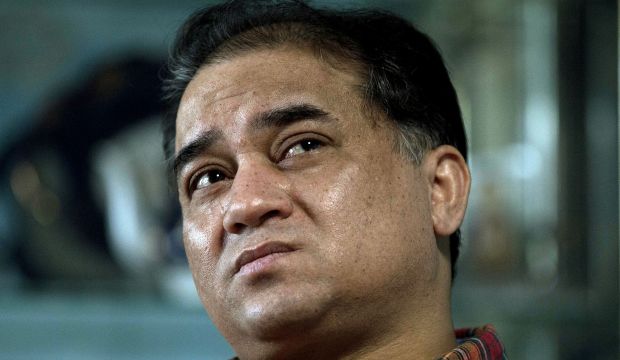
Ilham Tohti, an outspoken scholar of China’s Uighur minority, at his home in Beijing, China. (AP Photo/Andy Wong)
Beijing, Reuters—A Chinese court on Tuesday jailed for life the country’s most prominent advocate for the rights of Muslim Uighur people, a sentence that rights advocates said sent a clear signal that the government is determined to suppress dissent.
Economics professor Ilham Tohti, 44, stood trial for two days last week on separatism charges in the western region of Xinjiang. His case has provoked an outcry in the West and among international human rights groups.
“I’m innocent, I protest,” Tohti shouted to the court before the judge ordered police officers to drag him out of the courthouse, according to Tohti’s lawyer, Li Fangping.
Tohti’s wife, Guzaili Nu’er, who saw Tohti for the first time in eight months during last week’s trial, bawled in the courthouse when the verdict was announced, Li said.
Tohti, who is an ethnic Uighur, is the latest moderate intellectual to be convicted by Chinese President Xi Jinping’s administration.
The court also ordered the confiscation of all of his personal property.
“This is totally unacceptable,” Li said. “He will appeal. Based on the wording of the verdict, this case is extremely politicized.”
The sentence was met with dismay among the international community and rights advocates, who have come under increasing pressure from the government.
“It’s very shocking, much harsher than anybody expected,” said Maya Wang of the New York-based advocacy group Human Rights Watch. “It’s quite unprecedented for someone who is so prominent.”
In a statement, the European Union condemned the sentence, calling it “completely unjustified.”
In China, Tohti is regarded as an outspoken intellectual who has repeatedly criticized the government for not giving Xinjiang and its Uighurs more autonomy.
Uighurs are a Turkic-speaking people. Many resent restrictions on their culture and religion, and complain they are denied economic opportunities amid an influx of majority Han Chinese into Xinjiang.
The government has blamed a series of violent attacks in which hundreds of people have been killed on Islamist militants who it says want to establish an independent state in Xinjiang called East Turkestan.
The government says Uighurs are granted wide religious, cultural and linguistic freedom.
Tohti, who taught at Beijing’s Minzu University, which specializes in ethnic minority studies, has said he never associated with any terrorist organization or foreign-based group and “relied only on pen and paper to diplomatically request” human rights and legal rights for Uighurs.
His friends say he has never advocated independence for Xinjiang and he is proud to be Chinese.
“The tragedy of Ilham shows that solving a problem through peaceful means is impossible in China,” Dilxat Raxit, spokesman for the exiled World Uyghur Congress, said in an e-mailed statement.
Prosecutors in Xinjiang said Tohti had promoted independence for the region on a website he managed called Uighurbiz.net. State news agency Xinhua said that Tohti had “bewitched and coerced young ethnic students to work for the website and built a criminal syndicate.”
“He also colluded with foreign groups and individuals in hyping incidents related to Xinjiang with the aim of making domestic issues international,” Xinhua said.
Tohti told the court last week he established the website to promote dialogue between scholars and that he had publicly opposed separatism and violence, Li said.
Tohti had rejected the prosecution’s evidence and said statements against him by student volunteers who had worked on the website were made under pressure from authorities.
“It signifies that China is taking a hardline stance towards any Uighur moderates trying to put forward solutions that differ from the party’s approach,” William Nee, China researcher at Amnesty International, said of the sentence.
The charge of separatism carries a maximum penalty of death in extreme cases.
The United States, the European Union and human rights groups have called for Tohti’s release after an eight-month detention widely seen as part of a government crackdown on dissent in Xinjiang.
“We are always opposed to other countries interfering with our judicial independence,” Chinese Foreign Ministry spokeswoman Hua Chunying said at a daily news briefing, when asked about international criticism of Tohti’s case.
